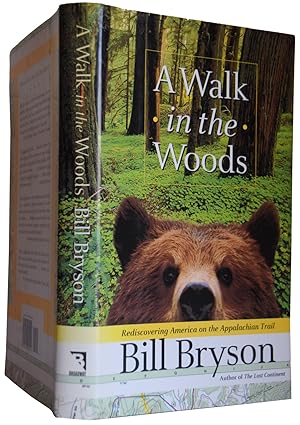

(I don't know that one, says Mary-Ellen, I thought I knew them all.) And in real life? We could ask Mary-Ellen, except one thing we know for sure about Mary-Ellen is she's not called Mary-Ellen, else she'd have sued Bryson's ass off by now. Brysons acute eye is a wise witness to this beautiful but fragile trail, and as he tells its fascinating history, he makes a moving plea for the conservation. Except in the book, where he says 'Cunnilingus'. When asked his star-sign by the tiresome Mary-Ellen (played by Kristen Schaal), Bryson's companion Stephen Katz (played by Nick Nolte) says 'Gemini'. Oddly, none of my own long-distance jaunts has been made into a movie with Robert Redford as me, married to Emma Thompson. 'A little voice in my head said: "Sounds neat! let's do it!".' To grab a gun and join the revolution to get pregnant with this particular bloke to spend most of next year walking northwards in a wood we decide these in an instant, without any of that overrated process known as rational thought. More serious mountain accounts have sections as long and tedious as the Great Smokey Mountains about motivation and mental health. Oddly, I didn't have the urge to carry on walking past trees all the way to Maine. Over the three days I walked past approximately one million trees. After two days of looking at trees from underneath I emerged onto a hilltop with a view. I did once do three days in the Appalachians. That's assuming there are some enjoyable bits of the Appalachian Trail.

Instead, he skips over all of the bits that are even slightly enjoyable

Bryson is determined to avoid this mistake. He has also served as chancellor of Durham University, which renamed its library in his honour as president of the Campaign to Protect Rural England and as the first non-British honorary fellow of the Royal Society.Most long-distance walk stories skip over the boredom and the really miserable bits. In the last two decades Bryson’s broad and infectious curiosity has prompted investigations of Shakespeare, the English language, the human body, and – most ambitiously – A Short History of Nearly Everything, which won the EU Descartes Prize for science communication and was shortlisted for the Samuel Johnson Prize. His subsequent travelogues include Notes from a Big Country, on his relocation to the US, A Walk in the Woods, on hiking the Appalachian Trail, and Down Under, on a trip across Australia. His first great success was The Lost Continent, an account of a trip round small-town America, and he came to greater prominence with an affectionate account of travels around Britain, Notes from a Small Island.

Bill Bryson was born in Des Moines, Iowa, but has lived most of his life in the UK.


 0 kommentar(er)
0 kommentar(er)
